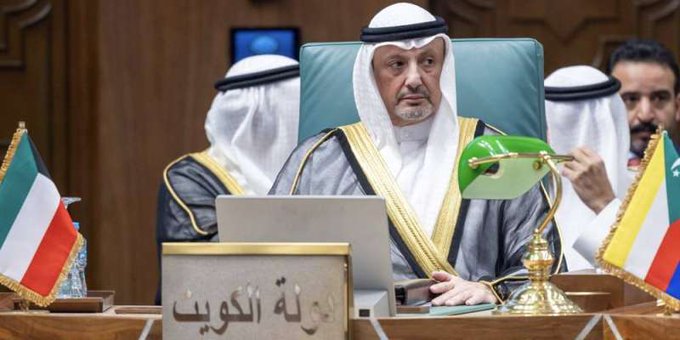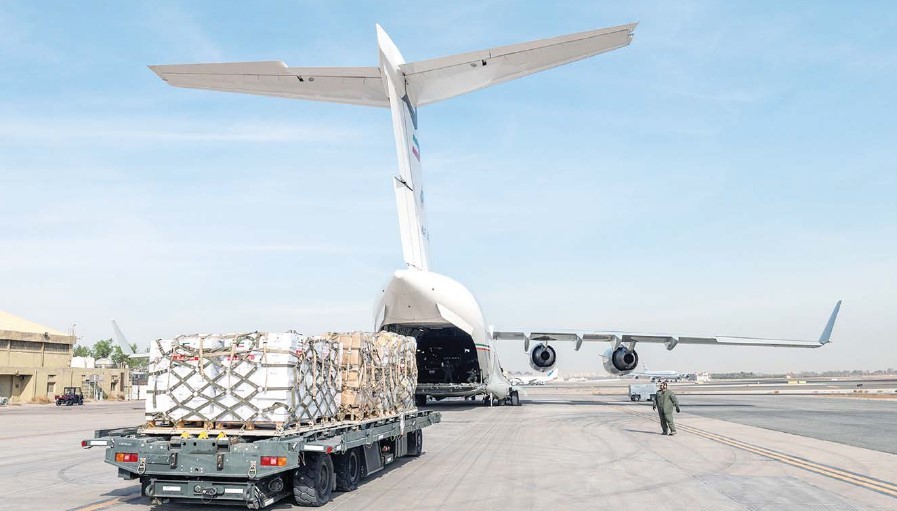29/10/2023
29/10/2023
DEIR AL-BALAH, Gaza Strip, Oct 29: Kuwait’s Minister of Foreign Affairs Sheikh Salem Abdullah Al-Jaber Al-Sabah reaffirmed the country’s steadfast stance against normalization until the establishment of an independent Palestinian state on the 1967 borders, in alignment with international resolutions and the Arab Peace Initiative. During a press conference, he emphasized, “This position is resolute, unambiguous, and unwavering.”

Sheikh Salem further expressed, “The ongoing events in Gaza constitute a retaliatory conflict, not an act of defense. What we are witnessing is a case of collective punishment and war crimes in Gaza. Over this period, we have sadly witnessed the loss of 7,000 lives, among which 3,000 are innocent children.” He questioned, “How can 3,000 children perish in just 23 days without it being considered a war crime?” He also highlighted, “The Security Council’s inability to halt the ongoing loss of life and destruction in Gaza is a regrettable situation. I earnestly hope that influential nations will promptly halt the hostilities, facilitate humanitarian aid into Gaza, and work towards a lasting resolution for the Palestinian predicament.”
He affirmed that Kuwait demanded the immediate end of the war in Gaza and called for the entry of humanitarian assistance and finding a sustainable and final solution for the Palestinian cause. In regards to relief aid efforts, Sheikh Salem revealed that an air bridge was established to deliver necessities and supplies to the people of Gaza, noting that the six planeloads of the initiative left Kuwait today to deliver 40 tons of supplies, continuing the efforts of previous days. He welcomed the calls by Palestinian President Mahmoud Abbas to hold an urgent Arab Summit, saying that the State of Kuwait welcomed all efforts to end the war in the Gaza Strip, an international demand reflected by a third of the UN member-states.
The Kuwaiti Foreign Minister also added that the Kuwaiti government and the National Assembly share a stance on the Palestinian cause and there were government-parliamentary efforts to legislate more laws forbidding dealings with the Zionist entity. Concerning parliament discussions over accepting the credentials of the new US Ambassador to Kuwait, Sheikh Salem said that the documents were approved and the delay in the US diplomat's presence in Kuwait was attributed to matters in Washington. “Once the Ambassador arrives in Kuwait, her credentials as Ambassador will be approved,” he affirmed.

Thousands of people broke into aid warehouses in Gaza to take flour and basic hygiene products, a U.N. agency said Sunday, in a mark of growing desperation and the breakdown of public order three weeks into the war between Israel and Gaza’s militant Hamas rulers. Tanks and infantry pushed into Gaza over the weekend as Israeli Prime Minister Benjamin Netanyahu announced a “second stage” in the war, which was ignited by Hamas’ brutal Oct. 7 incursion into Israel. Israel also pounded the territory by air, land, and sea. Gaza’s Health Ministry said the death toll among Palestinians has passed 8,000 - mostly women and minors. It’s a toll without precedent in decades of Israeli-Palestinian violence, and one that is expected to climb even more rapidly as Israel presses its ground offensive.
Over 1,400 people have died on the Israeli side, mainly civilians killed during the initial Hamas onslaught. The bombardment over the weekend - described by Gaza residents as the most intense of the war - knocked out most communications in the territory late Friday, largely cutting off the besieged enclave’s 2.3 million people from the world. Communications were restored to much of Gaza early Sunday. The Israeli military said Sunday it had struck over 450 militant targets over the past 24 hours, including Hamas command centers and anti-tank missile launching positions. It said more ground forces were sent into Gaza overnight, and circulated footage showing tanks and troops operating in open areas. The warehouse break-ins were “a worrying sign that civil order is starting to break down after three weeks of war and a tight siege on Gaza,” said Thomas White, Gaza director for the U.N. agency for Palestinian refugees, known as UNRWA.
“People are scared, frustrated, and desperate.” UNRWA provides basic services to hundreds of thousands of people in Gaza. Its schools across the territory have been transformed into packed shelters housing Palestinians displaced by the conflict. Israel has allowed only a small trickle of aid to enter from Egypt, some of which was stored in one of the warehouses that was broken into, UNRWA said. Juliette Touma, a spokesperson for the agency, said the crowds broke into four facilities on Saturday. She said the warehouses did not contain any fuel, which has been in critically short supply since Israel cut off all shipments after the start of the war.
Humanitarian
Israeli authorities said Sunday that they would soon allow more humanitarian aid to enter Gaza, though details remained unclear. Elad Goren, the head of civil affairs of COGAT, the Israeli defense body responsible for Palestinian civilian affairs, said Israel had established a “humanitarian zone” near the southern city of Khan Younis and recommended that Palestinians flee there. However, he provided no details on the exact location of the zone or how much aid would be available. He also said Israel has opened two water lines in southern Gaza within the past week.
The AP could not independently verify that either line was functioning. Meanwhile, as the 3-week-old Israel-Hamas war enters what Israeli Prime Minister Benjamin Netanyahu says could be a “long and difficult” new stage, US President Joe Biden is calling on Israeli and Arab leaders to think hard about their eventual postwar reality. It’s one, he argues, where finally finding agreement on a long-sought two-state solution to the Israel-Palestinian conflict should be a priority. “There’s no going back to the status quo as it stood on Oct. 6,” Biden told reporters, referring to the day before Hamas militants attacked Israel and set off the latest war.
The White House says Biden conveyed the same message directly to Netanyahu during a telephone call this past week. “It also means that when this crisis is over, there has to be a vision of what comes next, and in our view, it has to be a two-state solution,” Biden said. The push for a two-state solution - one in which Israel would co-exist with an independent Palestinian state - has eluded U.S. presidents and Middle East diplomats for decades. It’s been put on the back burner since the last American-led effort at peace talks collapsed in 2014 amid disagreements on Israeli settlements, the release of Palestinian prisoners, and other issues. Palestinian statehood is something that Biden rarely addressed in the early going of his administration.
By Fares Al-Abdan Al-Seyassah/Arab Times Staff and Agencies


